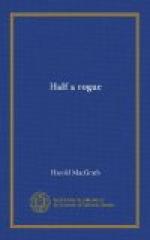“Your brother’s wife brought me to my senses. What I am to-day she in part has made. That is why I think so much of her; that is why I am happy to see that she is happy and has realized her heart’s desire. Heigh-ho! I believe I am making you my confessor.” He turned his face toward her now, and his smile was rather sad. “When I recall the worry I have given my poor old aunt, who loves me so, I feel like a contemptible scoundrel. How many countless sacrifices has she made for me, in the days when we had nothing! But she shall have all the comforts now, and all the love and kindness I am capable of giving her. I shall never leave her again.”
There were tears in Patty’s eyes. “It is never too late to mend; and when a man is penitent, truly and honestly penitent, much shall be forgiven him. It is only those who are by nature coarse who do not eventually surmount temptation. What you have told me I have known this long while.”
“You have known?” he cried with sinking heart.
“Yes. We live in a city where gossip travels quickly and thoroughly. Mrs. Franklyn-Haldene was telling mother one afternoon that you drank. I suppose she felt it her duty.”
“To be sure,” bitterly. “Was it while I have been living at home?”
“No; when the rumor came that you were coming.”
He shrugged expressively. “I ought to have known.”
“But come; you are up here to be cheered, not lectured. Let us play billiards. I can hear John and Kate playing now. We’ll play sides; and if we win against those two, I promise to call you Richard once a day while you are up here. Or, would you rather I played and sang?”
“Much rather,” brightening up a bit. “There is always time to play billiards. But first, I want you to come with me into the reading-room. I have something to show you; I had almost forgotten.”
“The reading-room?” puzzled.
“Yes. Will you come?”
She nodded her assent, and the two entered the house. Warrington, having arrived at the writing-desk, bade her sit down. He had an idea. Patty sat down.
“I want you to write something for me,” he said, pushing the pen and tablet toward her.
“What’s the matter with your hand?” she demanded.
“Nothing.”
“Then why do you want me to write?”
“I have never seen your handwriting. I’m something of an expert in that line. I’ll read your future.”
“But I don’t want my future read,” rebelliously.
“Well, then, your past.”
“Much less my past. Come; you are only beating about the bush. What is it you want?”
“I want to know,” he said quietly, “why you have kept me in ignorance all this while.” He laid the letter on the desk, and placed a finger on the water-mark. “It wasn’t fair to let me compose panegyrics over it all the while you were laughing in your sleeve. Ah, I’ve caught you. You can’t get away this time, Patty.”




